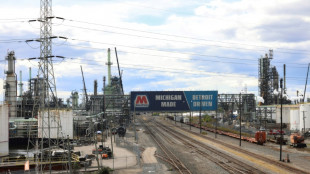
-
 Real Madrid break billion-euro revenue barrier to top Money League
Real Madrid break billion-euro revenue barrier to top Money League
-
Man City sign forward Marmoush from Eintracht Frankfurt

-
 WWF blasts Sweden, Finland over logging practices
WWF blasts Sweden, Finland over logging practices
-
How things stand in China-US trade tensions with Trump 2.0

-
 Most Asian markets rise after Wall Street's AI-fuelled rally
Most Asian markets rise after Wall Street's AI-fuelled rally
-
Colman to kick off Sundance as film world reels from LA fires

-
 Chief US diplomat vows 'unwavering support' for Israel
Chief US diplomat vows 'unwavering support' for Israel
-
Fire-hit Hollywood awaits Oscar nominees, with 'Emilia Perez' in front

-
 Nearly 200 Bangkok schools close over air pollution
Nearly 200 Bangkok schools close over air pollution
-
Daring attack pays off for Spain's Romo in Tour Down Under win

-
 Napoli host arch-rivals Juventus riding wave of Scudetto enthusiasm
Napoli host arch-rivals Juventus riding wave of Scudetto enthusiasm
-
Alpine skiing: Five things about the Kitzbuehel downhill

-
 J-pop star Nakai to retire after sex misconduct allegations: media
J-pop star Nakai to retire after sex misconduct allegations: media
-
New rider in town: Somalia's first woman equestrian turns heads

-
 Melbourne doubles feud as Kichenok accuses Mladenovic of 'direct threat'
Melbourne doubles feud as Kichenok accuses Mladenovic of 'direct threat'
-
Trump to take virtual centre stage in Davos

-
 Friedrich Merz: millionaire conservative on verge of German chancellery
Friedrich Merz: millionaire conservative on verge of German chancellery
-
Trump's return darkens mood as Germany heads to elections

-
 Pochettino happy after 'amazing' USA beat Costa Rica
Pochettino happy after 'amazing' USA beat Costa Rica
-
Most Asian markets extend AI-fuelled rally

-
 Bangladesh student revolutionaries' dreams dented by joblessness
Bangladesh student revolutionaries' dreams dented by joblessness
-
S. Korea investigators recommend Yoon be charged with insurrection, abuse of power

-
 Solar power surpasses coal in EU for first time
Solar power surpasses coal in EU for first time
-
Musk, Wikipedia founder in row over how to describe 'Nazi salute'

-
 Axel Rudakubana: troubled teen whose knife rampage shocked Britain
Axel Rudakubana: troubled teen whose knife rampage shocked Britain
-
Sasaki vows to 'give best' to fire-torn LA at Dodgers unveiling

-
 UK teen faces sentencing over murders that sparked riots
UK teen faces sentencing over murders that sparked riots
-
Larry Ellison, tech's original maverick, makes Trump era return

-
 Trump push to 'drill, baby, drill' may hit industry roadblock
Trump push to 'drill, baby, drill' may hit industry roadblock
-
Instagram courts TikTok stars during turbulent times

-
 Political crisis hits South Korea growth: central bank
Political crisis hits South Korea growth: central bank
-
Elephants are not people, US judges say

-
 Sinner aiming to be 'better, stronger' in Australian Open semi
Sinner aiming to be 'better, stronger' in Australian Open semi
-
Mass evacuations after explosive new fire erupts near Los Angeles

-
 Phoenix Motor Appoints Tony Zhou as Chief Technology Officer
Phoenix Motor Appoints Tony Zhou as Chief Technology Officer
-
Angle PLC Announces Trading Update

-
 The Now Corporation (OTC:NWPN) In Conjunction With Subsidiary Green Rain Solar Inc., Launch a Visionary Video Showcasing Solar Energy Solutions
The Now Corporation (OTC:NWPN) In Conjunction With Subsidiary Green Rain Solar Inc., Launch a Visionary Video Showcasing Solar Energy Solutions
-
Guardiola concedes Man City 'could not cope' with PSG as European hopes flicker

-
 PSG push Man City to brink with stunning Champions League comeback
PSG push Man City to brink with stunning Champions League comeback
-
Arteta wants sunshine break as Arsenal move towards last 16

-
 PSG comeback floors Man City as Arsenal near Champions League last 16
PSG comeback floors Man City as Arsenal near Champions League last 16
-
Trump toughens crackdown on immigration and diversity

-
 Celtic make 'little bit of history' with Champions League progress
Celtic make 'little bit of history' with Champions League progress
-
As Trump declares 'Gulf of America,' US enters name wars

-
 Celtic make Champions League progress thanks to Young Boys own goal
Celtic make Champions League progress thanks to Young Boys own goal
-
Trump's tariff threats are 'leverage,' says informal economic advisor

-
 Trump halts refugee arrivals in crackdown
Trump halts refugee arrivals in crackdown
-
Gangs could overrun Haiti capital if aid falls short: UN chief

-
 PSG sink Man City with stunning Champions League comeback
PSG sink Man City with stunning Champions League comeback
-
Leao sinks Girona and pushes Milan into Champions League top eight


Jews once again forced into exile from beloved Odessa
Forced yet again into exile, as so many times in their tormented history, Jews are leaving in droves from the Ukrainian city of Odessa, threatening the last traces of a once-vibrant culture.
The Black Sea port, a place steeped in Jewish history, now sees many joining the throngs as they pack buses and trains heading for Moldova or Romania.
Some will go on to Germany, the United States, or Israel.
Many are old, knowing that they may well never return.
Some have already experienced exile, like Gallina Dimievitch, 87, "a child of war" who fled the Nazis with her parents in 1942, and who is now returning to Israel to one of her sons.
Her husband died on February 24, the day of the Russian invasion.
"I thank God that he didn't see this," sighs the former engineer in a small and seedy Odessa hotel where departing Jews are gathered.
"Today I have to leave the land of my husband and my parents, leave their graves behind me," she says.
There was little choice: her town of Mykolaiev, 100 kilometres east, has been under heavy Russian bombardment.
"I remember my mother telling me about having to flee from the Nazis. I guess I feel like her today," says 72-year-old Clara.
- 'Disintegration' -
For Russia, Odessa has strategic and symbolic importance.
It is Ukraine's largest port and a commercial hub, but also holds a powerful place in Russian history, from its founding by Catherine the Great to its resistance against the Nazis to violent clashes between Ukrainian nationalist and pro-Russian protesters in 2014.
Odessa was home to a very large Jewish community until the 1940s, when it was decimated by massacres and deportations during World War II.
Some 40,000 Jews still lived there before the latest invasion, out of a million inhabitants, according to Rabbi Avraham Wolff, head of the ultra-Orthodox Chabad community in Odessa.
Since the start of the war, around 20 percent have already left, the rabbi told AFP by phone from Germany where he has gone to oversee evacuations.
"It's one of the most difficult times of my life, seeing this disintegration of the Jewish community.
"It has happened just as the community was starting to grow again, with nurseries, schools, orphanages, a university...
"The pain is very great, but now the only thing that matters is to get out and save Ukraine's Jews."
- 'Sick' -
The century-old Chabad Synagogue in Odessa, closed during the Soviet period, used to serve up to 150 worshippers a day before the war.
Now only two or three come to pray.
Olexsander Klimanov, 64, retired, with a grey cap on his head, is one of them.
His family was evacuated, but he has decided to stay.
"My whole life is in Odessa, I'm old, I can't adapt like young people, learn a new language," he says.
"This is not the first time that we have seen Jews take the road to exile," he adds, recalling the discrimination and mass emigration faced by Jews during the period of Soviet rule.
But to leave is to abandon a history, roots, a Jewish heritage that makes this city and its region "invaluable" for the community.
Important figures were born or lived here, such as the poet Haim Bialik and Israeli Zionist leader Vladimir Jabotinsky, and it is home to a huge Jewish cemetery.
"We must preserve the heritage," says Anna Bartaret, a young mother about to be evacuated with her two girls aged eight and 10.
A marketing manager, she was very involved in the Jewish community of Mykolaiev.
Her great-grandfather was a rabbi and she fears for the old books of the synagogue, including an 18th century Torah that she kept at her home.
Her face hardens at the mention of Russian President Vladimir Putin and his desire to "de-nazify" Ukraine whose president, Volodymyr Zelensky, is himself Jewish.
"Putin is sick," she says simply.
She plans to go only as far as neighbouring Moldova, she adds, determined that she will "return to Ukraine on foot when everything is over".
P.Hernandez--AT
